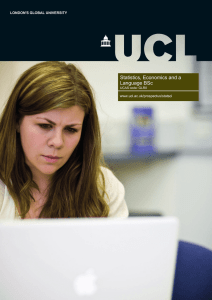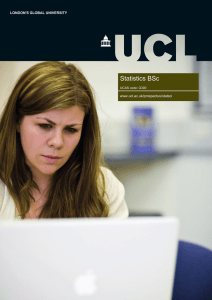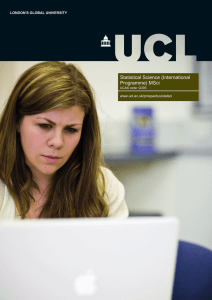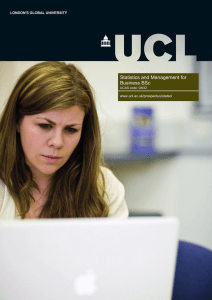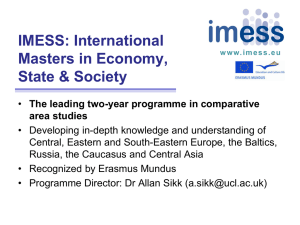Statistics, Economics and Finance BSc LONDON'S GLOBAL UNIVERSITY www.ucl.ac.uk/prospectus/statsci
advertisement
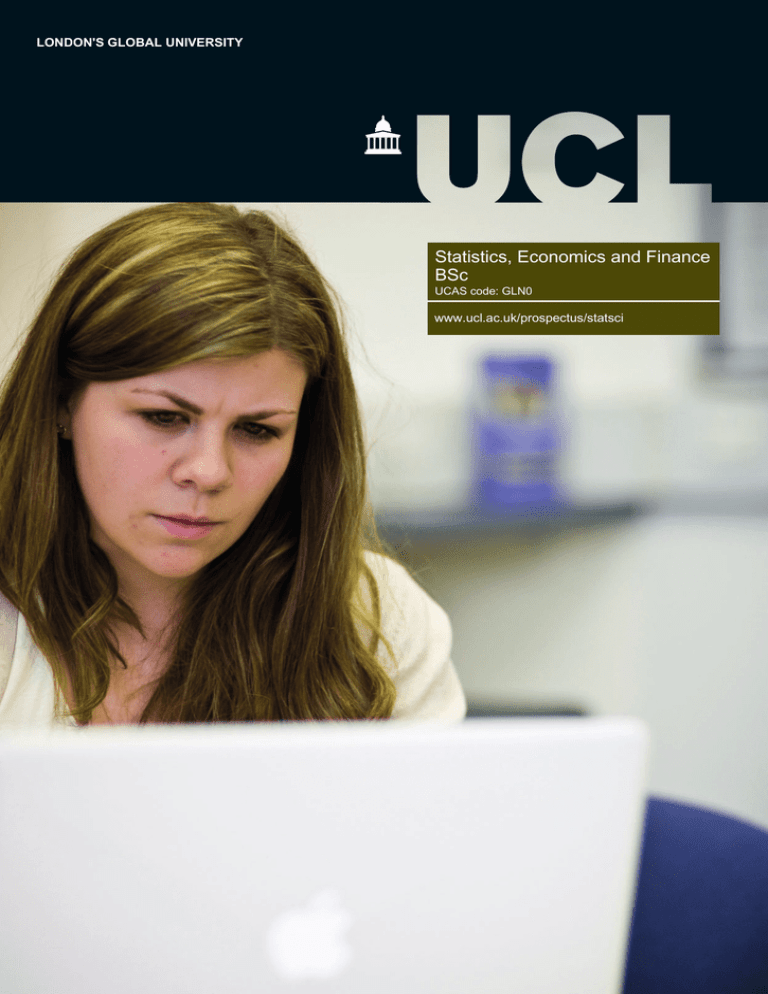
LONDON'S GLOBAL UNIVERSITY Statistics, Economics and Finance BSc UCAS code: GLN0 www.ucl.ac.uk/prospectus/statsci Statistics, Economics and Finance BSc This programme combines a thorough training in statistics with courses in economics and finance. The different components of the degree programme reinforce one another to provide a coherent and wide-ranging foundation in modern quantitative techniques useful for a career in finance. Degree summary • London is the financial capital of Europe and a leading global financial centre, and UCL is located close to the financial institutions in the City. • Second-year students may have the opportunity to apply for a 12-month placement with an actuarial employer, between years two and three of the degree. • The programme is accredited by the Royal Statistical Society (RSS) enabling you to be granted Graduate Statistician (GradStat) status if you achieve second-class honours or above and choose at least 50% of your year two and three courses in statistics. • Teaching is enhanced by the varied research interests of our academic staff; from the foundations of the subject to applications of statistics in science, medicine, industry, economics and finance. Your career Together with subject-specific knowledge, the programme is designed to equip you with skills valued by employers including: advanced numeracy and quantitative skills, analytical and problem-solving skills, and computing skills. You will also develop your research skills, communication skills and word processing skills through statistical project work. The demand for graduates with training in statistical science is now a permanent feature in both advanced and developing countries for jobs in finance, commerce, industry, research, education and government. Graduates from this department are well represented in all these fields, in this country and overseas, and recent graduates have continued to be successful in obtaining a wide variety of jobs. The statistics courses are drawn from the Statistics BSc degree. Your first year will include mathematics, statistics and some computing, which will be followed by increasing specialisation in statistics in the second and third years. The economics and finance components include a foundation in micro- and macroeconomics and financial accounting, and a range of options including courses in Money and Banking, Financial Computing, Econometrics and Economics of Finance. Popular career choices of previous graduates include the financial sector, training in the actuarial or accountancy professions and jobs in industry and commerce. Postgraduate study, for example in advanced statistics, medical statistics, actuarial science, finance or economics, provides further options. Your learning • Full-time student, MPhil in Management at the University of Cambridge • Full-time student, MSc in Finance at London School of Economics and Political Science • • • Trainee Actuary, Capita We employ a variety of teaching methods which include lectures, small-group tutorials, problem classes and computer workshops. Lecturers have regular 'office hours' during which you are welcome to come and ask questions about the course material. Most courses are examined at the end of the academic year in which they are taken using a combination of end-of-year examinations and in-course assessment. Prizes may be awarded to the most outstanding students in the first, second and third year. First career destinations of recent graduates (2010-2013) of this programme include: Risk Analyst, Royal Bank of Canada Associate, Ernst & Young Degree structure In each year of your degree you will take a number of individual courses, normally valued at 0.5 or 1.0 credits, adding up to a total of 4.0 credits for the year. Courses are assessed in the academic year in which they are taken. The balance of compulsory and optional courses varies from programme to programme and year to year. A 1.0 credit is considered equivalent to 15 credits in the European Credit Transfer System (ECTS). Year One Compulsory courses Accounting for Business Economics I Further Probability and Statistics Introduction to Practical Statistics Introduction to Probability and Statistics Mathematics for Students of Economics, Statistics and Related Disciplines I Mathematics for Students of Economics, Statistics and Related Disciplines II Optional courses All first year courses are compulsory. Year Two Compulsory courses Computing for Practical Statistics Introduction To Applied Probability Linear Models and the Analysis of Variance Mathematics for Students of Economics, Statistics and Related Disciplines III Probability and Inference Optional courses You will select 1.5 credits of optional courses, including at least one of the following: Applied Economics Economics II Remaining credits can be selected from a wide range of options. Options may include: Financial Computing Management Information and Control Money and Banking Social Statistics Final Year Compulsory courses Statistical Inference Stochastic Methods in Finance I Optional courses You will select 3.0 credits from a wide range of optional courses. Entry requirements A levels A level grades A*AA-AAA A level subjects A* in Mathematics or AA in Mathematics and Further Mathematics required. AS levels For UK-based students a pass in a further subject at AS level or equivalent is required. GCSE English Language and Mathematics at grade C. For UK-based students, a grade C or equivalent in a foreign language (other than Ancient Greek, Biblical Hebrew or Latin) is required. UCL provides opportunities to meet the foreign language requirement following enrolment, further details at: www.ucl.ac.uk/ug-reqs IB diploma open day may be required; in special cases, candidates may be interviewed. We will decide whether to invite you to an applicant open day on the basis of our assessment of your application. Your visit will include an opportunity to meet staff and current undergraduates, a tour of UCL, a taster lecture and introductory talks about the department and degree programmes. Fees UK/EU fee £9,000 (2016/17) Overseas fee £18,830 (2016/17) Notes Details about financial support are available at: www.ucl.ac.uk/study/ug-finance Contacts Contact IB points 38-39 Subjects A score of 18-19 points in three higher level subjects including grade 7 in Mathematics, with no score lower than 5. Dr Yvo Pokern Admissions Tutor Email undergraduate-admissions@ucl.ac.uk Telephone +44 (0)20 3108 4400 Prospectus entry www.ucl.ac.uk/prospectus/statsci Other qualifications Full lists of all degree programmes and other entry requirements can be found on our website at: www.ucl.ac.uk/otherquals Undergraduate Preparatory Certificates UCL's Undergraduate Preparatory Certificates (UPCs) are intensive one-year foundation courses for international students of high academic potential, who are aiming to gain access to undergraduate degree programmes at UCL and other top UK universities. For more information see our website: www.ucl.ac.uk/upc Your application Application for admission should be made through UCAS (the Universities and Colleges Admissions Service). Applicants currently at school or college will be provided with advice on the process; however, applicants who have left school or who are based outside the United Kingdom may obtain information directly from UCAS. When we receive your application we will consider your academic record, your predicted grades, your personal statement and your reference. Your application should demonstrate high academic ability, particularly in mathematics, an informed interest in all the components of your chosen degree programme and good communication skills. Attendance at an PDF Updated: February 20, 2016 Information correct at time of going to press. See website (www.ucl.ac.uk/prospectus/statsci) for latest information Key facts REF 82% rated 4* (‘world-leading’) or 3* (‘internationally excellent’) Department Statistical Science Faculty Mathematical & Physical Sciences

